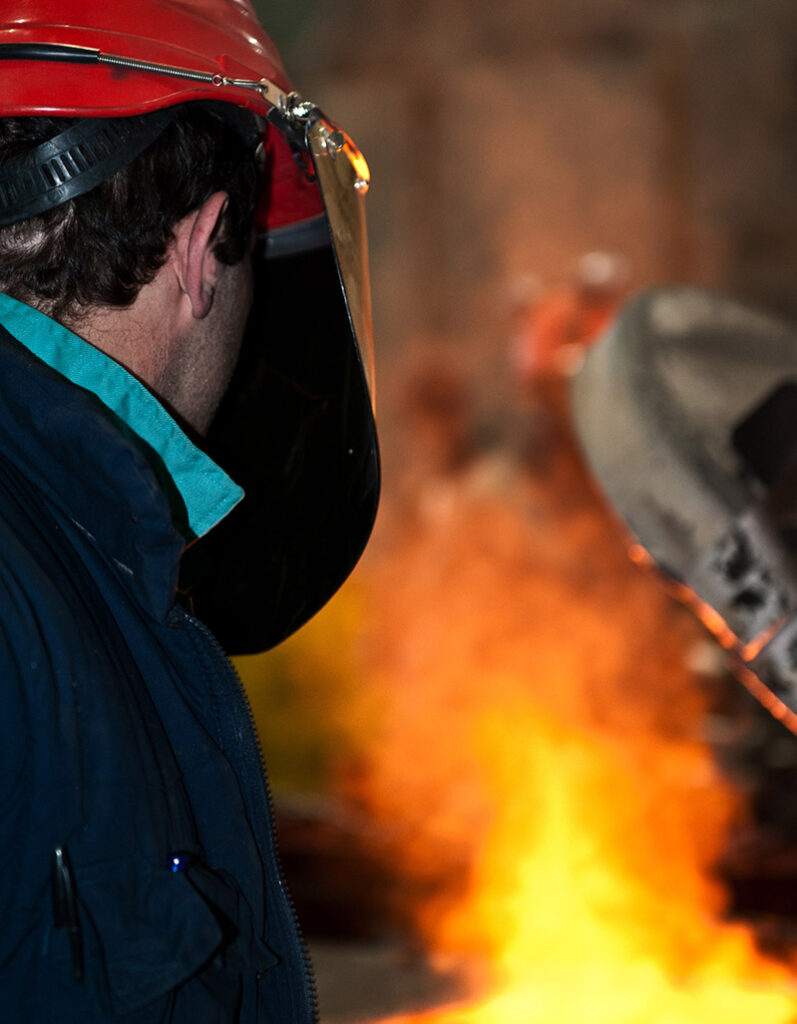Production AND DEVELOPMENT
Thanks to cutting-edge know-how and tools, we have become a benchmark in product co-design and development and a centre of research for new materials.
The FA foundry produces ferrous alloys of cast iron and steel, with two separate production units.
The types of cast iron produced include:
- Grey cast iron of different grades (GJL 200; 250; 300; 350) as per standard EN 1561 or the client’s own material standards;
- Special alloy grey cast iron for disc brakes;
- Abrasion-resistant cast iron (Ni-Hard – Cr-Hard) as per standard EN 12513 or the client’s own material standards;
- Spheroidal cast iron of different grades (GJS 400-15; 450-10; 500-7; 600-3; 700-2; 800-2; 900-2) as per standard EN 1563 or the client’s own material standards;
- High-ductility spheroidal cast iron, also for low temperatures (GJS 400-18 RT; 400-18 LT); • special solid-solution strengthened spheroidal cast irons (GJS 450-18; 500-14; 600-10) as per standard EN 1563;
- Ferritic spheroidal cast irons for high temperatures at different grades, alloyed with Silicon Molybdenum (SiMo, SiMoCr, special cast irons designed in the company);
- Austenitic spheroidal cast irons for high temperatures alloyed with Nickel-Chrome, like Ni-Resist.
In terms of steel, we produce both austenitic steels for high temperatures alloyed with Nickel-Chrome, as per standard 10295, and special steels for high temperatures which optimise performances and costs compared to known alloys, in collaboration with our clients.
The chemistry-metallurgy laboratory and the metrological laboratory are located in the heart of the foundry, acting as centres for the exchange of information and assessments between the production departments (core production, moulding, smelting) and the technical services (modelling, the technical office, maintenance).

The chemistry-metallurgy laboratory, staffed by technicians with decades of experience in constant collaboration and communication with the production departments, handles quality controls on products and on the production cycle: from the selection and acceptance of raw and auxiliary materials to determining smelting loads and casting parameters, melting and casting checks, checking the quality of foundry sand and cores, and controlling the chemical, mechanical, metallurgical and metrological characteristics of castings.
Over time, the company has built up a structure, skill set and instruments that allow it to take on research and development projects financed with internal resources and co-financed by institutions and clients. Some of these projects, in the field of materials, have enabled new ferrous alloys for high temperatures to be designed and, in some cases, patented. These may be of great interest to and highly appreciated by the market.
The level of resources used, the complex nature of the planning and experimentation carried out, and the opportunity to interact with research bodies outside of the company to conduct these projects have enabled the company to significantly increase its know-how and range of tools.
This in turn allows it to offer itself to current and future clients as a centre of excellence in development and co-design, and to establish itself as a research and control centre for new materials, within the context of Italy’s regional Innovation Hubs.
The 4 laboratories of the Quality service (chemistry-metallurgy, 2 metrological laboratories, non-destructive testing) are equipped with:
- 3 OES optical spectrometers for the chemical analysis of ferrous alloys on around 30 chemical elements, from the most common to those with only a trace presence. The chemical analysis is certified through a series of specific primary standards for each type of alloy. Having multiple tools ensures the continuity of checks, even in the case that one is undergoing maintenance or out of service;
- 1 LECO analyser for the IR chemical analysis of the elements C and S;
- 1 20KN universal machine for mechanical tensile and compression tests;
- Equipment for tensile and compression tests at high temperatures of up to 1,000°C;
- 1 experimental machine for thermal fatigue breakage tests at up to 1,000°C;
- 1 LEICA optical microscope with a camera and image capture and analysis software;
- A series of instruments from the +GF+ line for the analysis of foundry sand, some of which is carried out directly in the sand system;
- A work bench for the chemical and physical analysis of raw materials, cores and sand;
- Analytical balance and precision balance;
- Muffle furnace and drying chamber;
- 3 durometers (Galileo, Wolpert, Easy-Dur) to test HBW hardness in the laboratory and in production;
- 1 Charpy pendulum for resilience testing;
- 2 coordinate measurement machines (Hexagon and Zeiss);
- Kreon 3D scanner measurement arm;
- Profilometer;
- Roughness meter;
- Stereo-microscope to automatically control worked edges;
- Steinbichler optical scanner.
Under the direct guidance and control of NDT level 2 qualified operators:
- 1 machine for X-ray checks of internal integrity, with the related image development equipment;
- 2 ultrasound machines to check internal integrity, thicknesses and spheroidisation;
- Liquid penetrant testing equipment to check surface integrity.
